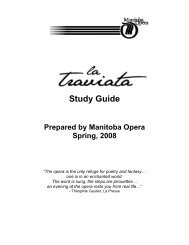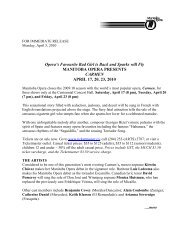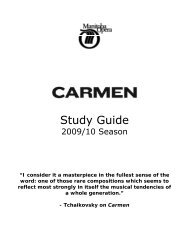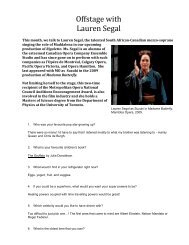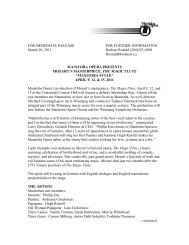The Barber of Seville Study Guide - Manitoba Opera
The Barber of Seville Study Guide - Manitoba Opera
The Barber of Seville Study Guide - Manitoba Opera
Create successful ePaper yourself
Turn your PDF publications into a flip-book with our unique Google optimized e-Paper software.
Did You Know?<br />
RELATED TOPICS OF STUDY<br />
<strong>The</strong>re’s a lot bubbling under the surface <strong>of</strong> this opera. <strong>The</strong> original play on which it<br />
was built was written in France by the playwright Beaumarchais (1732-99) about a<br />
decade before the French Revolution. He believed in freedom and equality for all<br />
people, regardless <strong>of</strong> rank. His <strong>Barber</strong> <strong>of</strong> <strong>Seville</strong> was considered quite radical<br />
because it dared to have a working class barber outsmart a member <strong>of</strong> the upper<br />
class, Dr. Bartolo. Beaumarchais wasn’t afraid to mock the conventions <strong>of</strong> his times,<br />
and he go into a fair bit <strong>of</strong> trouble for this as a result. <strong>The</strong> play that followed <strong>The</strong><br />
<strong>Barber</strong> <strong>of</strong> <strong>Seville</strong> was banned and eventually Beaumarchais was exiled from France.<br />
<strong>The</strong> first performance was a fiasco. Among several other incidents, Count Almaviva,<br />
disguised as Lindoro, came on stage with an un-tuned guitar. He was played by<br />
Manuel Garcia who had convinced Rossini to let him play a Spanish folk tune <strong>of</strong> his<br />
own arrangement. As he was tuning his guitar, a string broke. <strong>The</strong> audience hissed<br />
and booed when he began to sing. Rossini wrote Se il mio nome to replace the failed<br />
Spanish song before the second performance.<br />
In ancient times it was believed that human hair contained spirits, both good and<br />
bad, and bad spirits had to be cut out <strong>of</strong> hair in order for people to live happier<br />
lives. <strong>The</strong>re are records on papyrus <strong>of</strong> Egyptians using razors, and the ancient<br />
Greeks, too, were regularly shaved. Over the centuries, the role <strong>of</strong> barbers<br />
extended into minor surgeons. <strong>The</strong>y “let blood” by tying a client’s arm tightly with<br />
a strip <strong>of</strong> cloth and cutting a vein. “Patients” were allowed to bleed until they<br />
fainted, ridding the body <strong>of</strong> bad humours. <strong>Barber</strong>s were well respected in society<br />
because their skills provided the equivalent <strong>of</strong> walk-in clinics for their day: they also pulled teeth<br />
and applied leeches to draw blood out <strong>of</strong> infections. By the late 1700’s they were forbidden to do<br />
any surgery and their current pr<strong>of</strong>ession <strong>of</strong> providing just shaves and haircuts has not changed<br />
since that time. <strong>The</strong> red and white barber poles that still exist outside some barbershops reflect<br />
the blood-letting tradition: the used cloths were hung from a pole and the wind <strong>of</strong>ten wrapped<br />
and twisted them around the pole creating the design. <strong>Barber</strong>shop quartets are said to have been<br />
a way for barbers to pass the time singing while they waited for their next customers.<br />
Rosina’s character is a teenager and was likely upper class. In the 1700’s Rosina<br />
would have worn a corset (looks like a bustier) since the age <strong>of</strong> seven. Corsets<br />
were made <strong>of</strong> hard whalebone. Every day Rosina would have held her hands on the<br />
side <strong>of</strong> her ribcage and squished down at least two inches, while her servant Berta<br />
would be severely tightening the laces up her back. Once the corset was on, Rosina<br />
would not have been able to bend over and and touch her toes. You can see why<br />
having a servant was a necessity when all you could do was walk and sit. By 24,<br />
Rosina’s back muscles would have atrophied to the point that she would be unable<br />
to sit up straight without the corset. Rosina’s health would have been further compromised by<br />
being wealthy enough to afford sugar (it was believed that “you are what you eat” so they ate<br />
sugar to be sweet) and by the fashionable practice <strong>of</strong> wearing heavy face powder. Unfortunately<br />
the powder contained arsenic and lead which would slowly poison a person. <strong>The</strong> middle and lower<br />
classes couldn’t afford sugar or powder – lucky for<br />
them!<br />
21



